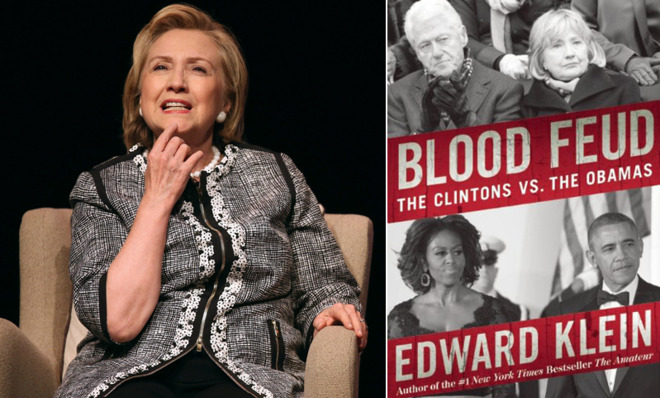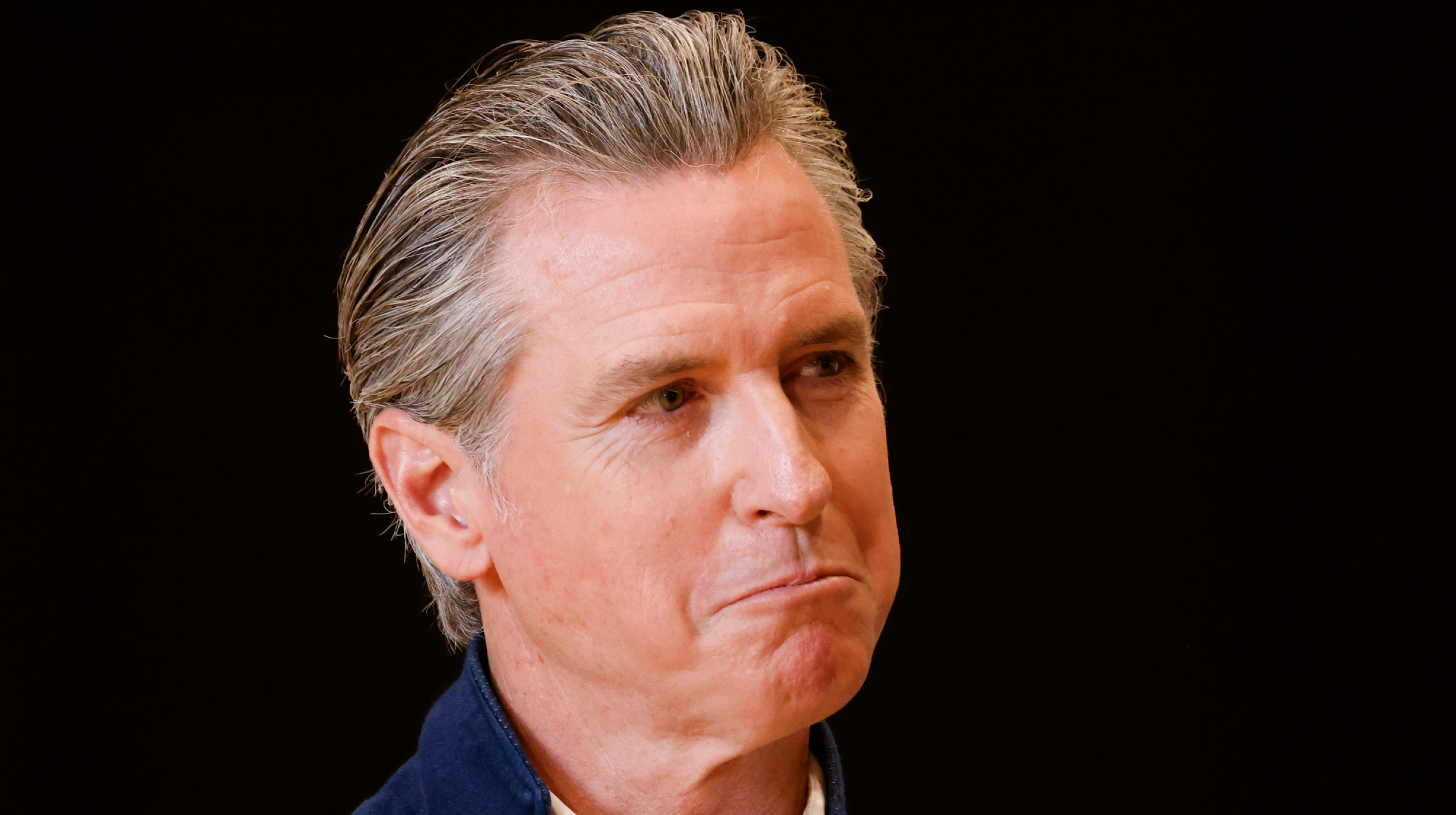Hillary Clinton's quotes in Blood Feud are jaw-dropping. And highly suspect.
The most inventive dialog from Ed Klein's newest tome


The mountain in Richard Dawkins' Climbing Mount Improbable refers to the gravitational pull of human doubt that something so stunningly complex as the human eye could be produced by a combination of random genetic mutations, natural selection, basic math, and eons of time. If you stick with it, you'll have reached the peak by the end of the book.
Ed Klein, author of Blood Feud: The Clintons vs The Obamas, however, starts somewhere on a mountain ridge, and by the end, is lost in the foothills of Mount Improbable. A lot of Blood Feud is highly improbable. I cannot say that it is false, or fake-but-accurate, because I cannot know for sure, and it would be reckless for me to assert that this reporting is not true simply because some of his previous reporting has been soundly discredited.
I should also address the irony of writing a blog post about a book that does not deserve any undue publicity. But I am struck by how deeply skeptical conservatives are about Klein, with master logician Rush Limbaugh questioning the truthfulness of his dialogue and Fox News hosts finding aggressive ways to question him. I am not surprised that some people pretend to believe it is true.
Subscribe to The Week
Escape your echo chamber. Get the facts behind the news, plus analysis from multiple perspectives.

Sign up for The Week's Free Newsletters
From our morning news briefing to a weekly Good News Newsletter, get the best of The Week delivered directly to your inbox.
From our morning news briefing to a weekly Good News Newsletter, get the best of The Week delivered directly to your inbox.
Like bad writing in movies, Klein's scenes seem designed to paper over enormous plot holes. Unlike good writing in movies, Klein does not do much to make the reader forget how utterly...improbable...his dialogue seems. Like clever high school students, many of Klein's claims are almost deliberately uncheckable. (Who is going to know exactly whether Barack and Michelle Obama sleep in separate beds beyond maybe three other people in the universe?). Here is dialogue attributed to Hillary Clinton, early in the book. It comes from a lunch she supposedly had with old friends at a restaurant near Chappaqua. (A lot of Klein's revelations come from other characters confessing their deepest thoughts to people they haven't seen in a while.)
"Obama has turned into a joke," she said sharply. "The IRS targeting the tea party, the Justice Department's seizure of AP phone records, and James Rosen's emails — all these scandals. Obama allowed his hatred for his enemies to screw him the way Nixon did. During the time I worked on the Watergate case, I got into Nixon's head and understood why he was so paranoid and angry with his enemies. Bill and I learned from that and didn't allow ourselves to go crazy bashing people who had anti-Clinton dementia, destroying ourselves in the process." [Blood Feud]
Read it again. Out loud. Notwithstanding the feat of memory it would take for someone to remember the quote verbatim, does it even sound like something Hillary Clinton would say, assuming she believed it? (For fact's sake, Clinton does not think the IRS improperly targeted the Tea Party and is much more humble about the way she and President Clinton treated their own enemies in the White House.)
So: improbable.
A free daily email with the biggest news stories of the day – and the best features from TheWeek.com
The dialogue goes on. Klein drops in a few F-bombs into the narrative exposition, which turns out to be a perfect encapsulation of his thesis: that Obama "reneged on the deal" to support Clinton in 2016 in exchange for her support in 2008. F-bomb, that Obama. What an F-bomb. On the next page, "Clinton" — it's time to start using scare quotes around the character to whom these words are attributed — says that her husband wanted to "wrest Hollywood people away from Obama" and wishes he did it "during the 2008 Democratic Party primary fight." Why "the 2008 Democratic Party primary fight?" Why the repetitive, unnecessary formality? It's obvious to everyone in the small group who "Clinton" is speaking to.
It's as if Clinton knew that she was confessing for the benefit of Ed Klein's sources, knowing they'd talk to him down the line and knowing that the pubic would require her innermost thoughts to be complete and intelligible. Thanks, Hillary!
A few bigger problems I have with the book. Yes, I tried to take it seriously as I read it.
--Valerie Jarrett does not sleep over at the residence.
--Valerie Jarrett (whom the book portrays as a Hillary Clinton antagonist) did not secretly offer the 2012 vice presidential nomination to Clinton.
--Michelle Obama has absolutely no interest in running for anything.
--Barack Obama was absolutely not "dead set" against allowing Bill Clinton to speak at his convention in 2012. The opposite is true.
--Also, Congress was not kept out of the loop about the CIA covert operation to find, buy, and begin to track, destroy, and transfer Libyan war material. The intelligence committees were briefed, as is required by law.
Everyone is portrayed as hyper-loyal and secretive — Hillary to Bill, Valerie Jarrett to Obama, Michelle to Barack — keeping their confidences extraordinarily tight, but then, they have those confidences betrayed without hesitation to an author who has a reputation for not liking Democrats.
Klein doesn't bother to hide some of his sources well. He quotes a "former Democratic governor of a large Eastern state" as telling him something juicy. Look it up. There's only one person who pits that description: Ed Rendell. Sure enough, Rendell is quoted on the record in a later chapter.
On Benghazi, Klein contradicts himself a lot.
Weirdly, if Klein decided to excise all of the first-person quotes from the Clintons and from the Obamas, his book would be about half of its current size and not a terrible introduction to the personality conflicts that do abound at the White House.
But writing historical non-fiction, I can tell you, is hard. It takes time. You can't really (unless you're Bob Woodward and have formal access to sources) spit them out every two years.
Unless, that is...
Marc Ambinder is TheWeek.com's editor-at-large. He is the author, with D.B. Grady, of The Command and Deep State: Inside the Government Secrecy Industry. Marc is also a contributing editor for The Atlantic and GQ. Formerly, he served as White House correspondent for National Journal, chief political consultant for CBS News, and politics editor at The Atlantic. Marc is a 2001 graduate of Harvard. He is married to Michael Park, a corporate strategy consultant, and lives in Los Angeles.
-
 Gavin Newsom mulls California redistricting to counter Texas gerrymandering
Gavin Newsom mulls California redistricting to counter Texas gerrymanderingTALKING POINTS A controversial plan has become a major flashpoint among Democrats struggling for traction in the Trump era
-
 6 perfect gifts for travel lovers
6 perfect gifts for travel loversThe Week Recommends The best trip is the one that lives on and on
-
 How can you get the maximum Social Security retirement benefit?
How can you get the maximum Social Security retirement benefit?the explainer These steps can help boost the Social Security amount you receive
-
 The last words and final moments of 40 presidents
The last words and final moments of 40 presidentsThe Explainer Some are eloquent quotes worthy of the holders of the highest office in the nation, and others... aren't
-
 The JFK files: the truth at last?
The JFK files: the truth at last?In The Spotlight More than 64,000 previously classified documents relating the 1963 assassination of John F. Kennedy have been released by the Trump administration
-
 'Seriously, not literally': how should the world take Donald Trump?
'Seriously, not literally': how should the world take Donald Trump?Today's big question White House rhetoric and reality look likely to become increasingly blurred
-
 Will Trump's 'madman' strategy pay off?
Will Trump's 'madman' strategy pay off?Today's Big Question Incoming US president likes to seem unpredictable but, this time round, world leaders could be wise to his playbook
-
 Democrats vs. Republicans: which party are the billionaires backing?
Democrats vs. Republicans: which party are the billionaires backing?The Explainer Younger tech titans join 'boys' club throwing money and support' behind President Trump, while older plutocrats quietly rebuke new administration
-
 US election: where things stand with one week to go
US election: where things stand with one week to goThe Explainer Harris' lead in the polls has been narrowing in Trump's favour, but her campaign remains 'cautiously optimistic'
-
 Is Trump okay?
Is Trump okay?Today's Big Question Former president's mental fitness and alleged cognitive decline firmly back in the spotlight after 'bizarre' town hall event
-
 The life and times of Kamala Harris
The life and times of Kamala HarrisThe Explainer The vice-president is narrowly leading the race to become the next US president. How did she get to where she is now?
